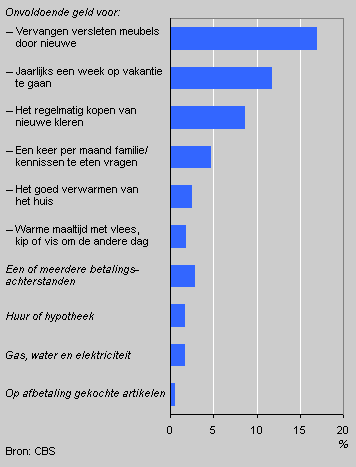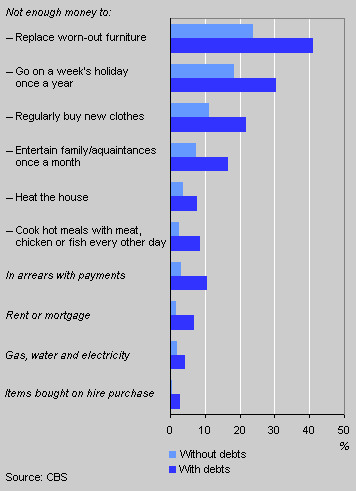Hard-up households: no new furniture, no holidays

Households that are hard up mainly cut back on new furniture or holidays. A total 40 percent of all households in the low income brackets owing money could not afford new furniture and 30 percent could not afford a week’s holiday. Over 10 percent were in arrears with their payments.
Households forgo holidays, furniture and clothing
Most households do not have serious financial problems.
Nevertheless one in six report not having enough money to replace worn-out furniture. Nearly one in eight lacked the money for a week’s holiday and one in twelve could not afford to buy new clothes when necessary.
Many households in arrears with payments
In 2002 almost three in every hundred households reported they were in arrears with their payments in the last previous twelve months. In absolute figures this corresponds to more than 200 thousand households. The payments concerned were mainly recurring expenses such as rent or mortgage, gas, water and electricity.
Financial problems of households, 2002

Financial problems often occur in low bracket income households. For instance, among 20 percent of households with the lowest incomes more than one in five lacked the money for a week’s holiday and one in twenty were in arrears with their payments, six times as many as in the highest income brackets.
Debts
More than one quarter of the lowest income households had run into debt . Financial problems are mainly found in this category: more than four in ten households did not have enough money to buy new furniture, while three in ten could not afford a week’s holiday. More than two in ten could not buy new clothes when necessary.
Financial problems of households in the lowest income brackets, 2002

Low income households with debts were more often in arrears with their payments. More than 10 percent had run into financial problems, over three times as many as low income households without debts.
Ger Linden